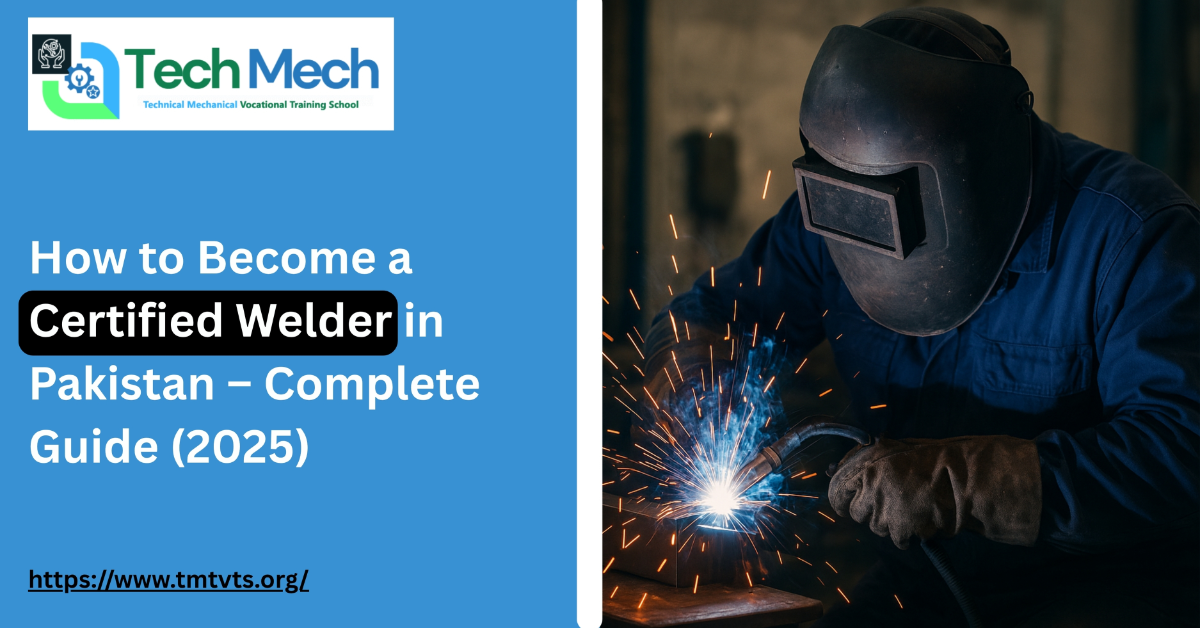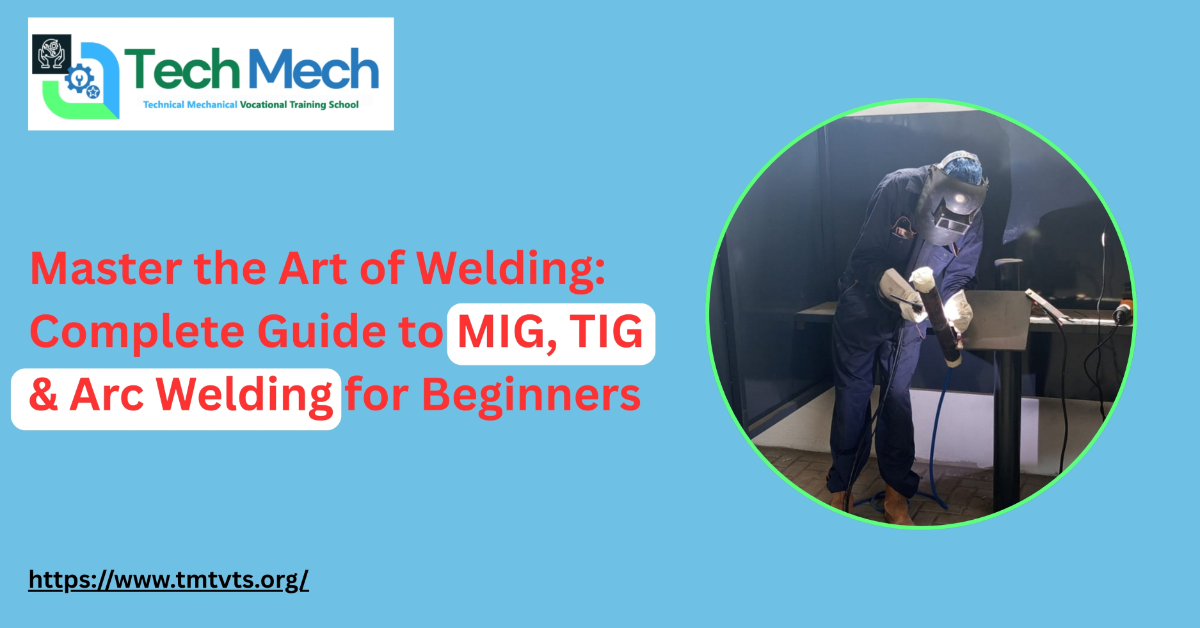Welding is the backbone of modern construction, manufacturing, and oil & gas industries. From skyscrapers to pipelines and shipbuilding to heavy machinery, welders are the silent strength behind every metal structure.
But in today’s competitive job market especially for those aiming to work in Pakistan or the Gulf region having hands-on skills isn’t enough. You need certified training that proves you meet international safety and quality standards.
This guide will walk you through how to become a certified welder in Pakistan, covering everything from training courses and certification types to costs, career options, and tips for finding the best welding school near you.
1. Understanding Welding Certification
A welding certificate is an official document proving that you have been trained and tested in a specific welding process. It shows employers that you can perform high-quality, safe, and reliable welds according to international standards like AWS (American Welding Society), ASME, or ISO.
In Pakistan, welding certifications are usually provided by recognized vocational institutes or technical training centers approved by government bodies like:
- NAVTTC (National Vocational & Technical Training Commission)
- TEVTA (Technical Education & Vocational Training Authority)
- TTB (Trade Testing Board)
These certifications are accepted both locally and abroad especially in the UAE, Saudi Arabia, Qatar, and Oman, where skilled welders are always in high demand.
2. Types of Welding Certifications in Pakistan
There isn’t just one type of certification different projects and industries require different welding techniques. Here are the most common ones:
2.1 Shielded Metal Arc Welding (SMAW / Stick Welding)
The most basic and widely used form of welding. Ideal for construction and repair work.
2.2 Gas Metal Arc Welding (GMAW / MIG Welding)
Used for manufacturing and automotive applications. It’s faster and cleaner than stick welding.
2.3 Gas Tungsten Arc Welding (GTAW / TIG Welding)
Preferred for stainless steel and aluminum jobs. TIG welders are highly valued in oil & gas and aerospace industries.
2.4 Flux-Cored Arc Welding (FCAW)
Common in shipbuilding and heavy fabrication projects.
2.5 Pipe Welding Certification
Specialized training for pipeline projects particularly important for welders aiming to work in the Gulf region.
3. Steps to Become a Certified Welder in Pakistan
Becoming a certified welder doesn’t happen overnight. It requires training, practice, and testing. Here’s a clear step-by-step path:
Step 1: Meet the Basic Requirements
Before you enroll in a welding course, make sure you meet the following:
- Minimum Education: Matriculation or equivalent (some institutes accept Middle pass).
- Age: Usually 18 years or above.
- Physical Fitness: Good eyesight and hand-eye coordination are essential.
Step 2: Choose the Right Welding Course
Depending on your career goals, you can start with a basic welding course (3 to 6 months) or move to advanced certifications (up to 1 year).
Popular course types include:
- Basic Welder Training (for beginners)
- Advanced TIG/MIG Welding
- Pipe Welding Course
- 6G Welder Certification (high-level test for pipe welders)
Step 3: Select the Best Welding School in Pakistan
Your choice of training center makes a big difference. Look for institutes that offer:
- Hands-on training with modern equipment
- Qualified instructors with Gulf experience
- Internationally recognized certification (like AWS or ASME standards)
- Job placement assistance or connections with overseas recruiters
Example: Tech Mech Technical Vocational Training School is one of the top-rated institutes offering certified courses for welders, pipe fitters, and grinders training students for jobs in Pakistan and abroad.
Step 4: Get Practical Training
This is where you’ll spend most of your time. Expect daily hands-on sessions covering:
- Welding safety and PPE usage
- Metal cutting and joint preparation
- Practical welding on mild steel, stainless steel, and aluminum
- Reading and understanding welding blueprints
Step 5: Pass the Welding Test
After training, you’ll undergo a trade test or certification exam. You’ll be tested on your ability to produce clean, strong welds under specific conditions.
Successful candidates receive an official welding certificate your ticket to professional welding jobs.
Step 6: Apply for Jobs or Overseas Opportunities
With certification in hand, you can:
- Join local fabrication or construction companies.
- Apply for Gulf welding jobs (UAE, KSA, Qatar, Oman).
- Specialize further and become a welding inspector or supervisor.
Cost and Duration of Welding Courses in Pakistan
| Course Type | Duration | Average Cost (PKR) | Certification |
|---|---|---|---|
| Basic Welding | 3 months | 25,000 – 45,000 | Local (TEVTA / NAVTTC) |
| Advanced MIG/TIG | 3 months | 60,000 – 90,000 | Local + International |
| Pipe Welding (6G) | 3 months | 60,000 – 100,000 | International / Gulf Standard |
| Welding Inspector Course | 3 months | 80,000 – 140,000 | AWS / ASNT / CSWIP |
Tip: Always confirm that the institute is registered with NAVTTC or TEVTA before enrolling.
5. Career Opportunities for Certified Welders
Certified welders enjoy excellent job opportunities both locally and internationally.
In Pakistan
- Construction companies
- Fabrication workshops
- Power plants and oil refineries
In Gulf Countries
- Oil & Gas projects
- Shipyards and offshore rigs
- Infrastructure development (metro, pipelines, high-rise buildings)
A skilled and certified welder can earn anywhere between PKR 50,000 to 200,000 per month, depending on the project and country.
6. How to Choose the Best Welding School in Pakistan
Before you sign up, consider these factors:
- Accreditation: Is the school registered with NAVTTC, TEVTA, or an international body?
- Equipment Quality: Do they have modern welding machines (MIG/TIG/ARC)?
- Instructor Experience: Do trainers have industry or Gulf experience?
- Job Placement Rate: Does the school assist with overseas job placement or visa processing?
- Course Flexibility: Can you choose weekend or evening classes if you’re working?
Pro Tip: Visit the institute personally. A quick tour of their workshop will tell you more than any brochure can.
7. Common Mistakes to Avoid When Starting Your Welding Career
- Skipping Safety Training: Always learn and follow safety standards.
- Choosing Cheap, Unregistered Centers: Unrecognized certificates are often rejected abroad.
- Not Specializing: Focus on one or two welding processes (like TIG or pipe welding) for better job prospects.
- Ignoring Practice Time: Welding is a skill learned through hours of real practice, not just theory.
8. FAQs About Welding Certification in Pakistan
Q1. How long does it take to become a certified welder in Pakistan?
Usually between 3 months to 1 year, depending on the type of course and your skill level.
Q2. What is the best welding certification for working abroad?
A 6G Pipe Welding Certificate is highly valued in the Gulf region and major international projects.
Q3. Can I learn welding after matric?
Yes! Most vocational training centers accept students after matric or even middle-level education.
Q4. Is welding a good career in Pakistan?
Absolutely. Welding offers steady income, overseas opportunities, and a growing demand in local industries.
Q5. Where can I find the best welding school in Pakistan?
Tech Mech Technical Vocational Training School offers hands-on training, international certifications, and job placement support for welders, pipe fitters, and grinders.
Conclusion: Your Welding Career Starts with the Right Training
Becoming a certified welder in Pakistan is one of the smartest career moves for those seeking stable, high-paying jobs both locally and abroad. With proper training, recognized certification, and dedication to skill improvement, you can join the ranks of highly respected professionals building the world’s infrastructure.
Call-to-Action (CTA)
If you’re ready to start your welding journey, contact Tech Mech Technical Vocational Training School today. We provide professional training and recruitment solutions for:
- Welders
- Pipe Fitters
- Grindermen
Take your first step toward a brighter career join Tech Mech today and build your future in metal!





